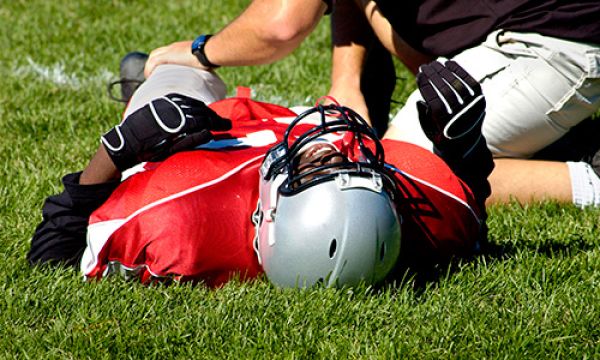
The Danger of Concussions and What Parents Can Do

with Andy Harcourt, MD
As fall sports kick back into action, parents of young athletes are watching out for injuries on the field. The American Association of Neurological Surgeons reports there are nearly 300,000 sports-related concussions every year in the U.S.—with more than 62,000 sustained in high school contact sports. Concussions are especially common injuries for football players, cheerleaders, and basketball players in the fall athletic season.
Dr. Andy Harcourt, a sports medicine specialist at Baldwin Bone and Joint, defines a concussion as “a hit to the head that causes temporary neurological symptoms.” Kids suffering from concussions typically develop a headache, followed by dizziness, difficulty focusing, nausea, sensitivity to light, and sometimes vomiting.
When it comes to recognizing the signs of a concussion, parents are in the best position to gauge their child’s symptoms. Dr. Harcourt advises parents to look out for changes in behavior, encouraging them to “be aware when kids don’t seem like themselves.”
“They might be spaced out, feel slowed down, have trouble concentrating or remembering their words, and feel overwhelmed by stimuli like being around a lot of people,” Dr. Harcourt explains.
Concussions should always be managed immediately to minimize the danger of the child suffering a second concussion before he or she is fully recovered from the initial one. Your child will typically recover from a first concussion in a week, but a second concussion that takes place before he or she has fully recovered from the initial brain injury can make the whole recuperation process take as long as a month collectively. Neglecting to detect and treat concussions, especially multiple concussions, could lead to long-term problems for your kids as they enter young adulthood. These long-term issues may include depression, insomnia, difficulty concentrating, and even difficulty sustaining relationships.
Parents can take action to manage a child’s concussion even before scheduling an appointment with a doctor. “If you suspect that your child has a concussion, it’s important to monitor them to see if the condition is deteriorating and to be aware that it could be a more severe condition such as a brain bleed, which often mimics a concussion in the first 20 minutes,” Dr. Harcourt said.
A physician will conduct several neurological tests and compare them with your child’s baseline cognitive testing to evaluate their condition. It’s recommended that parents take their child out of the activities that put them at risk for a second concussion and limit stimulation to the brain until he or she recovers.
“A child who has suffered a concussion needs ‘cognitive rest,’” Dr. Harcourt notes. “This might involve not going to the school the next day and being away from interaction with classmates. Things that are bright and loud, like TV or other screens, also slow down recovery from a concussion.”
Is your child showing the signs of a concussion after a game or practice? Schedule an appointment with Dr. Andy Harcourt at Baldwin Bone and Joint in Daphne, Alabama. Please call (251) 625-2663 for your consultation today.